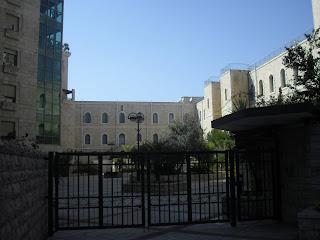Walking around Jerusalem can be amazing. The stone is so white that one is literally blinded by the light. It can take a few minutes for one's eyes to adjust upon entering a building. Then there is the cacophony of languages that is heard on the street. This morning, as I walked to the yeshiva, I heard Hebrew, English, Russian, Arabic, Spanish, French, something that sounded Slavic but am not sure, several variations of dog and cat languages, birdsong and lots of honking horns. Couldn't understand most of what I heard but things were said quite forcefully.
Had a good day of learning. Rabbi Joel Levy led a shiur on Co-existence. Coming from my world I automatically assumed it would be about interfaith relations but it was actually about intrafaith pluralism focussing on Beit Hillel and Beit Shammai. We learned texts about Machloket L'shem Shamayim - arguments for the sake of Heaven. In other words, arguments or disagreements that are undertaken where both parties are going at it for a good cause, with good intent, not trying to one-up each other, not having base political reasons for this argument. The argument/discussion/exercise itself becomes a true act of Torah. The thing is - can these arguments just go on forever or do they need to be resolved at some point? or, put differently, Do communities, true pluralistic communities, need basic rules and standards by which to live or can they just flounder about forever "in process?" In one text, the Bat Kol (basically a heavenly voice) intercedes and provides a ruling thereby providing us with an answer. There is much more to it than that, of course, but that's enough for now.
The basic question in Talmud and today is: How are those with different strands of Jewish practice and belief expected to get along? Can they? Who makes the rules and who determines who will go along with them? Equally importantly, when do these rules get to be changed and by what process is change made? Do these questions sound familiar? They should. These are the questions that define the age in which we live. The answers define our current Judaism, will determine the Judaism that our children see and will determine the Judaism that our grandchildren will live.

No comments:
Post a Comment